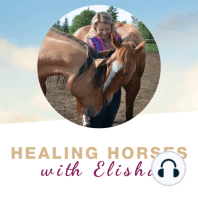22 min listen

03: Feeding Horses Beet Pulp - the Myths and Facts
03: Feeding Horses Beet Pulp - the Myths and Facts
ratings:
Length:
20 minutes
Released:
Oct 18, 2023
Format:
Podcast episode
Description
The use of beet pulp in equine diets has sparked a wave of controversy, igniting fiery debates and arguments within the equestrian community. There are many myths and misconceptions surrounding the use of beet pulp, and people want to know if it is safe and beneficial for their horses or if it could be harmful. In this episode, I share safe feeding practises and explain what you need to watch out for when feeding beet pulp to your horse to help you decide whether or not it will benefit your horse.Understanding Beet PulpContrary to common misconceptions, beet pulp is not a high-sugar feed. It is primarily the fibrous material left behind after sugar extraction. It has an 18% crude fiber content that includes insoluble and soluble components, with a significant amount of pectin. Pectin is highly digestible and easily absorbed by horses, making beet pulp an exceptional source of dietary fiber. Given the importance of gut health and digestion, beet pulp offers a viable option for horses that require additional fiber, detoxification support, and improved microbial balance.Debunking Sugar MythsConcerns about sugar content often overshadow the benefits of beet pulp. While it originates from the sugar beet industry, beet pulp is not inherently high in sugar. It is essential to distinguish between sugar content and the glycemic index, which measures how carbohydrates affect blood glucose levels after consumption. The fiber in beet pulp mitigates its glycemic index, making it a suitable option for sugar-sensitive horses. Pelleted beet pulp, for example, ranks at approximately 69 on the glycemic index scale, well below the 100-mark set by oats. By soaking and rinsing beet pulp, the glycemic index can be further reduced to about 34, making it a crucial consideration for exceptionally sugar-sensitive horses. Concerns about Toxicity and GMOsThere are some concerns regarding the potential toxicity of beet pulp. Yet those issues largely depend on the manufacturing process and supplier practices. Chemicals used to remove beet tops, inorganic iron content, and soil mineral composition are all factors that affect the toxicity risks of beet pulp. Conducting thorough research and selecting reputable suppliers allows horse owners to minimize those concerns. The debate surrounding genetically modified organisms has prompted a growing demand for non-GMO beet pulp. Horse owners can find those products through diligent research or networking with fellow equestrians. Even though some concerns exist, the overall health benefits of the fiber content of beet pulp outweigh the potential toxicity issues, particularly when focusing on gut health and detoxification.Feeding Practices To Ensure Safe ConsumptionChoking is a concern when feeding horses beet pulp, especially when it is served dry or inadequately soaked, so proper feeding practices are essential to ensure safe consumption. Beet pulp can expand up to four times its volume, necessitating a four-to-one ratio of water to beet pulp during soaking. Soaking for two and a half to three hours, preferably with warm water, facilitates this process and prevents the pulp from absorbing vital fluids from the horse's digestive tract. I recommend a cautious approach for horses with compromised gut health or a history of digestive issues, starting with small quantities of soaked beet pulp and gradually increasing it to ensure their digestive systems can adapt. While choking incidents are rare, proactive soaking and proper feeding practices can mitigate this risk.Is Beet Pulp a Valuable Addition to Equine Nutrition?Beet pulp does emerge as a valuable addition to equine nutrition. Despite the ongoing debates and concerns, the potential benefits of beet pulp for digestive health, microbial balance, and detoxification remain...
Released:
Oct 18, 2023
Format:
Podcast episode
Titles in the series (31)
01: The Principles of Holistic Horse Health by Healing Horses with Elisha